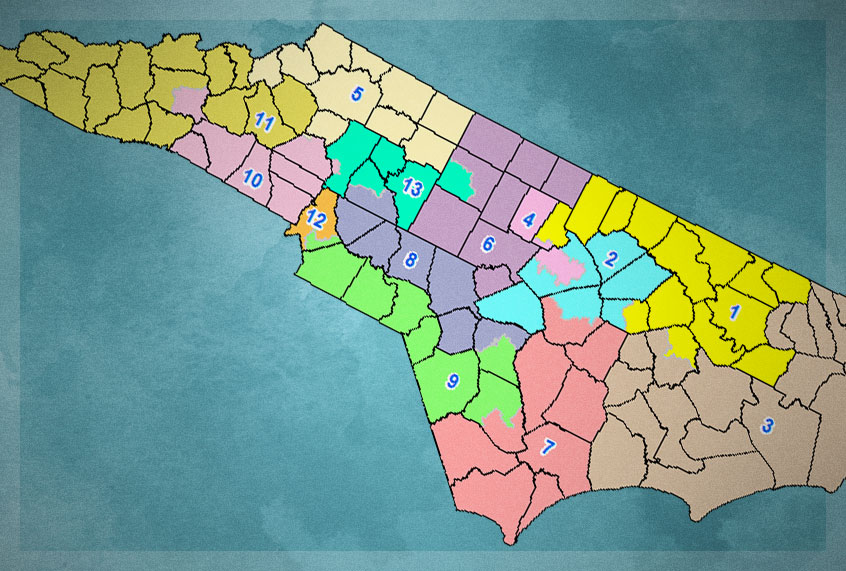North Carolina Republicans lied about their racially gerrymandered district map in an attempt to stop a special election, advocacy group Common Cause said in court filings Thursday.
The group said that files found on longtime GOP gerrymandering architect Thomas Hofeller’s hard drive after his death last year show that the North Carolina Republican Party misled a federal court into extending the deadline for revising the state’s legislative districts, which had been ruled an unconstitutional racial gerrymander.
Hofeller, who was paid millions by the Republican National Committee, left behind a trove of hard drives and flash drives detailing his work for the party. His estranged daughter discovered the files and turned them over to advocacy groups challenging the Republican policies in court.
Some of the files relate to Covington v. North Carolina, a lawsuit challenging North Carolina’s racial gerrymander. The Republican-led legislature was ordered in 2016 to draw new maps by a federal district court. The Supreme Court agreed that the maps were unconstitutional but sent the case back to the district court to determine how soon the maps must be implemented, the New York Times reported.
Republicans told the court that they would not be able to redraw maps in time for a special election in 2017. The party said it had not “start[ed] the laborious process of redistricting earlier” than July 2017, and could only “begin the process of compiling a record in July 2017 with a goal of enacting new plans by the end of the year.” State GOP leaders said they needed additional time to “engage in internal discussions about the design of remedial districts” and “prepare draft remedial plans.” The court was convinced and allowed the illegal map to stay in place for another year.
During a legislative hearing, North Carolina state Rep. David Lewis, a Republican who led the redistricting effort, said that there was not “anything that has been drawn by Dr. Hofeller or anybody else that you know of that have not yet been released.”
“I have not yet drawn maps nor have I directed that maps be drawn, nor am I aware of any other entity operating in conjunction with the leadership that has drawn maps.” Lewis said.
Common Cause said the newly discovered files show that the Republican Party’s statements to the court were false.
The Hofeller files, they said, show that the party had already completed more than 97 percent of the new Senate plan and 90 percent of the new House plan by June 2017.
Common Cause said the files also show that Republicans lied about their use of racial data in redistricting. Republicans said that “data regarding the race of voters was not used in the drawing of the districts, and, in fact, was not even loaded into the computer used by the map drawer to construct the districts.”
“We have not had and do not have racial data on any of these districts,” they said. “There was no racial data reviewed in the preparation of this map.”
But according to the court filings, Common Cause said Hofeller’s files show that none of the above statements were true.
Hofeller’s files showed data “regarding the racial composition of the proposed districts for each and every iteration of his draft maps,” according to the filings, and even displayed the black voting-age population in some of his draft maps.
Hofeller had “racial data on the draft districts in Excel spreadsheets,” the filing said.
But the federal court was told a completely different story and decided to allow the illegal gerrymander to stay in place for another year. Republicans’ veto-proof majority in both chambers of the North Carolina legislature was finally broken in 2018, after the maps were redrawn.
During their extra year with supermajority power, Republicans redrew judicial districts and tweaked election rules for the state Supreme Court, while voting to strip power from newly-elected Democratic Gov. Roy Cooper.
Republicans, including Lewis, have denied that Hofeller had any input on the district maps and have described him as a private citizen who drew the maps “on his personal computer on his own time,” the Times reported.
The evidence on Hofeller’s computer would seem to indicate otherwise. Hofeller continued to be paid millions by the Republican National Committee right up until he died last year, suggesting that his work was part of the party’s overall strategy.
Along with his longtime gerrymandering efforts, the files also showed that Hofeller was the driving force behind the Trump administration’s decision to add a citizenship question to the 2020 census —Stephccccc and even provided part of the dubious justification for the addition that was used verbatim in Justice Department documents.
Hofeller said that the question was necessary to draw maps based only on the number of voting-age citizens instead of the total population. These maps, he wrote, “would clearly be a disadvantage to the Democrats” and “would be advantageous to Republicans and non-Hispanic whites.”
After lobbying the Trump administration to add the question, he urged them to justify the addition by claiming that it was necessary to enforce the 1965 Voting Rights Act and increase Hispanic turnout, despite writing the exact opposite just months earlier.
Republicans are now fighting the revelations in court, accusing Stephanie Hofeller, the dead man’s daughter, of illegally providing advocacy groups with the documents. If not for her, troves of damning revelations about the Republican Party’s attempts to redraw maps to help “non-Hispanic whites” would have never seen the light of day.
“Virtually no public record of Mr. Hofeller’s work on gerrymanders exists beyond the maps themselves,” The Times reported, “because he was obsessive about leaving no paper trail that could be used against his handiwork in court.”

